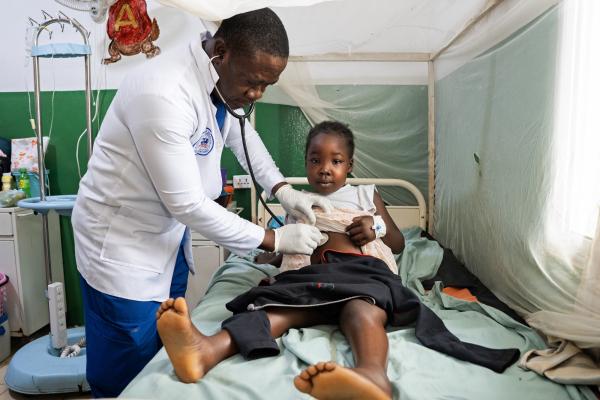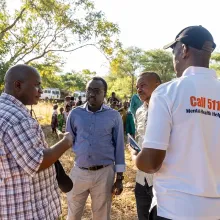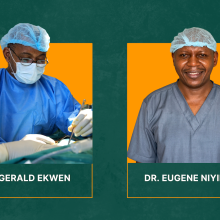Global health is finally getting the attention it deserves—but not for the right reasons. The interdisciplinary field and its impact—on everyone, everywhere—has become more visible in recent months due to foreign aid cuts enacted by the U.S. government.
Since 1987, PIH has worked hand-in-hand with governments and local partners worldwide to deliver high-quality, patient-centred care in some of the most rural and hard-to-reach settings. This work is rooted in long-term commitments, trust, shared goals, and local leadership.
Still, when we use the term “global health”, what exactly do we mean? Below, learn more about the field, PIH’s role, and why global health is at risk.
What is Global Health?
Broadly speaking, global health is “an area for study, research, and practice that places a priority on improving health and achieving equity in health for all people worldwide,” as defined in a widely cited 2009 Lancet report. However, there are growing critiques of this definition, and experts across the field offer differing interpretations.
The field also includes “advocacy, research, [and] activism toward the reduction of disparities and protection against global threats,” explains Dr. Sterman Toussaint, PIH Liberia’s director of clinical services. At PIH, advocacy has always played a role in our work, from advocating for access to treatment for patients living with HIV/AIDs in the 1980s to recently mobilizing more than 16,000 calls and letters to Congress urging the protection of foreign aid.
There’s no denying that global health is complex—shaped by historical injustices that have led to systems designed to make it challenging for people to receive health care and for governments and societies to provide it, notes PIH Chief Medical Officer Dr. Joia Mukherjee in a webinar about her textbook, “An Introduction to Global Health Delivery: Practice, Equity, Human Rights.” The 14-chapter book explores the history of the global health movement, the systems necessary to deliver high-quality health care, and the critical role of advocacy.
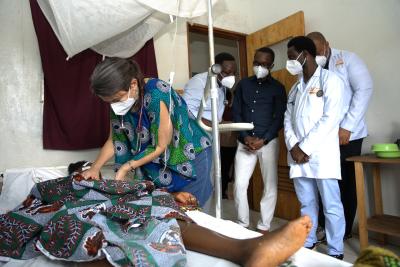
Dr. Joia Mukherjee, PIH’s chief medical officer, examines a patient in the multidrug-resistant tuberculosis ward at J.J. Dossen Memorial Hospital. Behind them, PIH Liberia doctors, including medical residents, observe the visit as part of their training.
Photo by Luther N. Mafalleh / PIH
This essential work is carried out by varied organizations, including multilateral organizations, such as the World Health Organization; bilateral organizations, such as the now dismantled USAID; and non-governmental organizations, such as PIH.
In a unique approach, PIH combines a broad social justice mission with a rigorous clinical and academic model for action. Our work is driven by a moral call to health equity and backed by evidence-based care delivery and research.
Unlike others in the field, we address the root causes of disease by tackling social determinants of health and forming deep partnerships to support long-term, holistic care. Grounded in solidarity, we expose and challenge the systemic injustices that drive poverty and sickness.
PIH’s Role in Global Health
For nearly four decades, PIH has responded to the moral imperative to provide high-quality care globally to those who need it most. We currently collaborate with national governments in 10 countries around the world to fight social injustice, together. We strive to ease suffering by providing a comprehensive model of care that includes access to food, transportation, housing, and other key components of healing.
“I want people to understand that global health isn’t charity—it’s about fairness and systems change. It’s about training health workers, equipping clinics, addressing social determinants, and building sustainable systems that work for the most vulnerable. And the solutions often come from within communities themselves—they just need support and recognition,” says Dr. George Dalitso Limwado, PIH Malawi’s senior medical officer.
While the work looks different across each PIH care delivery site—adapting to local context and culture—our mission remains the same.
“Global health matters because health challenges don’t respect borders—whether it’s infectious diseases, drug resistance, or the effects of climate change. But more importantly, it reflects our shared humanity. Investing in global health is investing in justice, stability, and economic development for all. We’ve seen firsthand in places like rural Malawi how global solidarity can translate into real, life-saving care,” says Limwado.
The Future of Global Health
Global health is currently under threat.
Funding continues to be slashed for lifesaving global health programs, initiatives, and clinics in countries around the world, including ones where PIH works. The U.S. government’s foreign aid cuts and freezes have already had a devastating impact on health systems. For example, in six districts across Lesotho, U.S.-funded HIV and tuberculosis programs have been dismantled, clinics are closing, and health workers are being laid off.
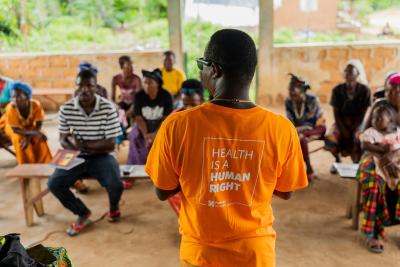
A community health worker educates families about tuberculosis during a community outreach event in Kono District, Sierra Leone.
Photo by Sean Andrew Bangura / PIH
“Global advocacy and activism should intensify to force the powerful to stop the cycle of impoverishment in low- and middle-income countries,” says Toussaint.
PIH was founded on the premise that health is a human right, not a privilege. We believe that national governments hold the primary obligation to respect, protect, and fulfill that right, while communities must be empowered to fully participate in its realisation. Perhaps most importantly, we believe that the international community also holds a responsibility—as duty bearers of the right to health—to work in solidarity with governments and communities to make health equity a global reality.
As the U.S. government continues to attack funding for lifesaving patient care, we remain where we are needed most. We will continue fighting for global health—for everyone, everywhere, as long as it takes.
